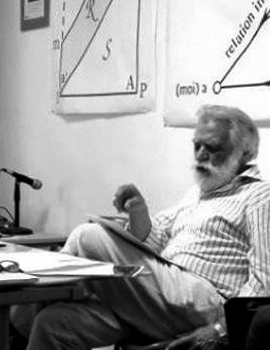Subject and Masses.
Psychoanalysis and the
Politics of the Uncon-scious
The “Elvio Fachinelli” Institute of Advanced
Psychoanalytical Studies
The European Journal of Psychoanalysis
IPRS – The Psychoanalytical Institute for Social Research
The Department of Dynamic and Clinical Psychology
of University of Rome I, “La Sapienza”
“Subject and Masses.
Psychoanalysis and the Politics of the Unconscious“
A Webinar in fifteen seminars for 2021 marking the one hundredth anniversary of “Group Psychology and the Analysis of the Ego”
(“Massenpsychologie und Ich-Analyse”, Sigmund Freud, 1921)
The Elvio Fachinelli Institute, the European Journal of Psychoanalysis, the IPRS and the Dynamic and Clinical Psychology Department of La Sapienza University of Rome, one hundred years after Group Psychology and the Analysis of the Ego was first published, promote a reflection on the meaning and implications of a work that could potentially open a psychoanalytically-based political perspective.
Experts from Italy and other countries have been invited – not only psychoanalysts, but also historians, philosophers, political scientists – to re-discuss Freud’s approach to social life, taking into account what the social sciences have developed in this last century.
The seminars, of approximately two hours each, will be held on fifteen Fridays of the year 2021, regularly at 6 p.m., from 19 February to 18 December.
Participation to the webinar requires free registration.
We propose the following considerations and preliminary questions:
01
Group Psychology and the Analysis of the Ego is correlated to two other crucial texts of the same period: Beyond the Pleasure Principle (1920) and The Ego and the Id (1923).
The former introduces, alongside libido and all-uniting Eros, the death drive that destroys human groups. The latter illustrates what Freud meant by the Ego, not only as a psychic instance beside the Beyond-the-Ego (the Super-Ego) and the It (the Id), but also as an overall psychic synthesis of the subject in its constitutive division, which extends in both the It and the Beyond-the-Ego.
In Group Psychology and the Analysis of the Ego, Freud draws on some of his earlier works: Three Essays on the Theory of Sexuality, On Narcissism: An Introduction, Mourning and Melancholia and Totem and Taboo (the work of a Freud inspired by Lamarck and Haeckel, but also by Darwin, considering that in Group Psychology he writes: “In 1912 I took up a conjecture of Darwin’s to the effect that the primitive form of human society was that of a horde ruled over despotically by a powerful male”).
02
The Freudian conception of authority rests on a traumatic event beyond memory, the killing of the father, which lives again in the Oedipus myth and in each of its unconscious re-editions, in which an individual epos reaffirms itself, in which subjects break away from the group and assert themselves.
This authority shifts from imposition to the interiorized self-directed control upon which mass and bureaucratic organizations rest.
Interiorization, which reveals a possibility alternative to guilt and to the fear of castration in erotic ties, occurs on the basis of identifications with certain ideals or with the figures of leaders. The interpretative innovation, the psychoanalytic specificity introduced by Freud (in contrast to imitation as an aggregating factor, of which Gustave Le Bon and other authors who despised “the masses” spoke), consists precisely in this.
03
Members of groups identify with their leaders by internalizing them as their Ideal Ego or putting them in the place of their Ego Ideal, in a process along horizontal relationship lines that unites them as brothers. Here the lines of narcissism intersect those of the object relation.
But can an identification, which should in theory solve dependency on the external, translate instead into its perpetuation? Or is the real problem the value content of this identification, the interior assimilation of something unethical – which has by this point turned into something independent from any external referent – and perpetual?







































